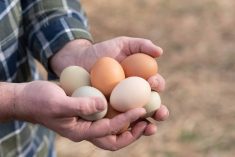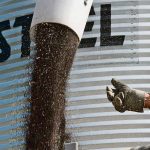It’s hard to believe 2021 is almost at an end. Thank you for a great year and for your emails, phone calls, photographs and letters. You are the reason I do this job and I love hearing from you. Your passion for farming, the land, your families and for producing healthy food is inspiring. And you all work so hard. I see this side of you every day.
However, while speaking with a couple of farmers recently, I could also see a passion for activities outside of farming. For example, I was amazed by the Lego Technic model sets John, who farms near Dauphin, Man., builds and collects. These are not the Lego bricks I grew up with in the ’70s. They’re highly detailed models inspired by real vehicles and machines, like the Lamborghini Sian FKP 37 or the John Deere 6130R tractor.
Read Also

Health hazards are often overlooked risks on the farm
While quite different from the dangers posed by farm machinery, hazards such as loud noise or sun exposure require the same proactive attention, the Canadian Agricultural Safety Association says.
“It’s Lego for big boys,” says John, whose first Technic set was the Space Shuttle 8480 released in the 1990s. Since then, he’s put together around 50 models. His Lamborghini has 3,696 pieces and it took him several weeks to finish with daily sessions around 20 minutes. He says the detail involved is incredible.
“There are little pistons in the motor and a transmission with the clutches, and you can shift it and it moves the gears around, and there’s a synchronizer,” says John. “If you’re at all mechanically inclined, you can appreciate how they’re able to duplicate the real thing.”
To get these models to fit together you must pay attention to detail and follow the steps otherwise “it will burn you later because it’s not put together right. Attention to detail keeps you on your toes,” says John. Some of his models include a Ferrari, Porsche, several helicopters, a Mack truck, Ford F-150 Raptor and a Volvo mining truck.

For John, the greatest reward is in the process. “I find it very relaxing to do and they’re pretty cool with how realistic they are. It’s important to be patient and to not push it.” A quick search at lego.com came up with Technic sets for all budgets. They generally range from $50 and around 600 pieces all the way up to $600 and almost 4,000 pieces.
I also received a photo from Sam, a farmer from southern Alberta, who discovered a passion for woodworking after he retired from farming. Before retirement, the tools he used were more suited to his daily work, and the things he’d build were functional for the farm.
“If you couldn’t build it with a chainsaw, an axe and a ball-peen hammer, you didn’t need it,” says Sam, before discovering his love of making intricate and beautiful things like breadboards, bowls, trays, coasters and platters with wood inlays. Recently, he’s made around 130 picture frames for friends, family and, for his other passion, his photography.
“It keeps my mind busy, my hands busy and keeps me from sitting there eating, watching TV and getting old,” he says.
When Sam was a snowbird travelling to California and then later to Mesa, Ariz., he’d sometimes spend six hours a day in the woodshops at the parks where he lived. “The time literally flies. Often my wife would call me for lunch or supper and I could hardly believe the time,” he says.
Sam also loves to find and repurpose the materials for his craft. “It’s always fun to figure out how to build something out of an old piece of junk or retired piece of machinery and not spend anything on it other than welding rods and a cutting disc.”
Sam’s projects take him anywhere from an hour or two to several days or even weeks, he says. His projects involve problem-solving and precision. “Once you know how to do it and you can keep it straight in your mind, it is so simple, but you have to be precise. When you put the pieces together, if you’re out by 1/32 of an inch, it’s going to multiply its problems and you’re going to be way out. If you can get it within 1/100 of an inch, that’s good.”
According to Lauren Van Ewyk of Wellspring Counselling Services, there are three good reasons why hobbies are so much more than passing time doing something you enjoy.
A farmer as well as a registered social worker, Van Ewyk says hobbies can grow your identity, which is particularly helpful for farmers.
“What has happened with farmers is no longer are we all of these things — a local coach, someone involved with the church, a person who likes to bake, or someone who is really good with machinery and fixing things, or a person who is creative at business planning. Instead of acknowledging all of those different talents and personality pieces, we put ourselves in this ‘I’m a farmer’ identity,” she says.
“The important thing for farmers to do is to recognize we are many things and lots of our different talents contribute to our effectiveness as farmers. There’s more to our story than that sole identity of being a farmer.”
By tying up so much in that identity, there’s a lot of pressure to succeed or be constantly on the ball, she adds. “Sometimes when farmers feel like they’re failing at farming they believe they are failing at life and that’s an unfortunate misleading line of thought because we are many things.”
Another benefit of taking up a hobby has to do with what’s called chronic cortisol exposure. Farmers are 68 per cent more likely to experience chronic stress than the general population, which is a huge number. And farmers experience high stress levels over long periods of time and become subject to chronic cortisol exposure, says Van Ewyk. Not ridding the body of cortisol typically leads to feelings of hopelessness and helplessness, and one of the most effective ways to get rid of it is exercise. “If one of your hobbies includes exercise, that’s really helpful to deal with chronic stress,” adds Van Ewyk.
Finally, almost three in five farmers meet the criteria for anxiety. One of the ways to deal with anxiety is by building skills, says Van Ewyk.
“A lot of times people think anxiety is inside of themselves. That’s not the way we target it. The way we target it is we take it outside of ourselves. Anxiety kind of sits on our shoulder and talks to us and tries to control us. It likes to be in the driver’s seat and have you feeling like you’re not in control. It very much wants to be in control. One of the ways we effectively address anxiety is by building skills. When we build skills confidence grows. When we have more confidence, we’re more likely to kind of boss that anxiety back and really make sure it’s not in the driver’s seat,” she says.
“Hobbies do the same thing. Maybe it’s a hunting hobby and you’re bringing home a meal and that builds confidence, or maybe it’s learning how to play hockey or how to grow a different type of plant under unusual circumstances. All of those skills actually build confidence, and it puts you in a better position to tackle anxiety.”
What hobbies do you currently enjoy or are going to explore when time allows? Send us your photos ([email protected]) of you and your hobby with a short description and we’ll select some to print in a future issue of Grainews.
Have a wonderful festive season,
Kari
















